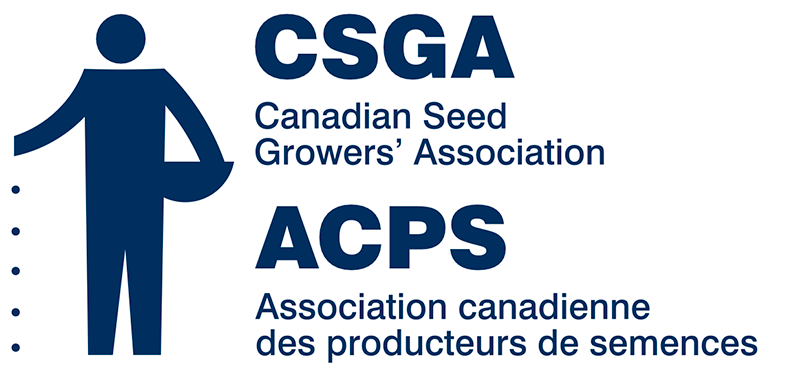CSGA Standards and Consultations
About Seed Certification Standards
The Canadian Seed Growers’ Association (CSGA) provides an officially recognized, third-party service for the certification of seed crops of most agricultural field crops in Canada. CSGA is responsible for both establishing and administering the certification requirements and standards. Certification of the seed crop by CSGA is the first step in the official certification of the harvested seed, which is the responsibility of the Canadian Food Inspection Agency (CFIA).
CSGA is also the delegated authority for certifying Breeder and Select seed crops, and approving Breeder and Select seed as eligible parent seed for further pedigreed seed crop production.
We invite you to read our Standards Development, Maintenance and Oversight Policy.
Our Seed Crop Standards
The Canadian Regulations and Procedures for Pedigreed Seed Crop Production (Circular 6) sets out procedures and requirements that a seed grower and a seed crop must meet for CSGA to certify the crop. There are general requirements relating to all certified seed crop production and more specific requirements that vary by crop kind and status or class of seed being produced. The crop-specific requirements, including previous land use, isolation requirements and maximum impurity standards, relate to maintaining the varietal identity and purity of the seed to be harvested.
Circular 6 describes the procedures and requirements that a seed grower and a seed crop must meet in order for CSGA to certify that crop.
The requirements in Circular 6 and other aspects of Canada’s national seed certification program ensure that Certified seed is not only true-to-type but also has good germination and freedom from impurities, including other crop kinds and weeds.
Our Breeder Seed Standards
The Canadian Breeder Seed Requirements (BSR) are used in conjunction with Circular 6 and describe some additional certification requirements and standards that a plant breeder and a Breeder seed crop must meet for the CSGA to approve Breeder seed and issue a Breeder seed crop certificate.
The requirements include recognition of plant breeders, general requirements applicable to Breeder seed crop production, such as variety certification eligibility and breeders’ quality management systems, and standards specific to Breeder seed crops over and above those described in Circular 6.
Why Are These Standards Important?
Plant breeders develop new varieties that benefit producers, food manufacturers and consumers. Producers benefit from higher-yielding varieties, improved lodging and disease resistance, and herbicide tolerance. Producers and food manufacturers also benefit from improved quality parameters such as high protein in field peas or wheat, malting quality in barley or food-grade quality in soybeans.
Certified seed is also often referred to as pedigreed seed because the pedigree of the seed can be traced at every step, right back to the original Breeder seed. Traceability is an increasingly important component of modern agriculture and food production systems. Certified seed is the gateway to new and improved genetics – realizing the benefits of a new variety and gaining access to premium markets in some cases. Certified seed is an important risk management tool that reduces costs and maximizes the benefits of other inputs such as fertilizer and pesticides.
The Standards Development Process
Developing requirements and standards for new crop kinds or types and the annual review of existing standards is one of the core functions of the CSGA. This work is led by CSGA’s Regulatory Services Committee (RSC) and supported by CSGA’s Plant Breeders Committee as well as eight crop-specific working groups of technical experts from key stakeholder groups within the seed sector.

Their mandate is to ensure that CSGA’s standards are science-based, fit-for-purpose, reflect current technologies, and meet the needs of the seed and agriculture sectors. CSGA also seeks to ensure that Canadian standards are harmonized with the certification requirements and standards of our international trading partners, including members of the Association of Official Seed Certifying Agencies (AOSCA) and countries participating in the Organisation for Economic Co-operation and Development (OECD) Seed Schemes.
Following a public consultation, proposed standards and recommendations from the RSC are presented to CSGA’s Board of Directors, who ensure that the standards development process has been followed and that there is sufficient rationale and consensus among stakeholders for the revision. The official revised version of Circular 6 is posted to CSGA’s website annually on February 1 of each year. The BSR is amended when needed and is also available online.
Learn more about CSGA’s standards development process here.
Stakeholder Engagement and Transparency
CSGA is committed to stakeholder engagement and transparency in developing and reviewing standards through public consultations. Consultations are posted on CSGA’s website and usually run for at least eight (8) weeks. Through a variety of activities, including webinars, surveys, and direct emails, feedback is sought from key stakeholder groups, including seed growers, seed companies, plant breeders, seed analysts, authorized seed crop inspection services (ASCIS) and licensed seed crop inspectors (LSCI), agricultural organizations and government.
Current Consultations and Notifications
- Proposed Circular 6 Update: NEW Provisional Standards for Hybrid Hemp
Completed Consultations and Notifications
Please note that these past consultations are no longer open for comment.
- Circular 6 Notice of Housekeeping Revisions (closed Jan 15, 2026)
- Consultation on Industrial Hemp Isolation Requirements (closed Nov. 3, 2025)
- Proposed Circular 6 Update: Removing the Form 50 Requirement (closed Nov. 1, 2025)
- Winter 2025 Consultation: Mechanical purity of cereal seed crops (closed March 5, 2025)
- What We Heard Report, May 2025
- Fall 2023 Consultation: Forage and Turf Grasses and Legumes (closed Nov. 15, 2023)
- What We Heard Report, January 2024
- Circular 6 consultation, October 2022
- Results, December 2022
- Breeder Seed Requirements (BSR) consultation, October 2022
- Results, June 2023







